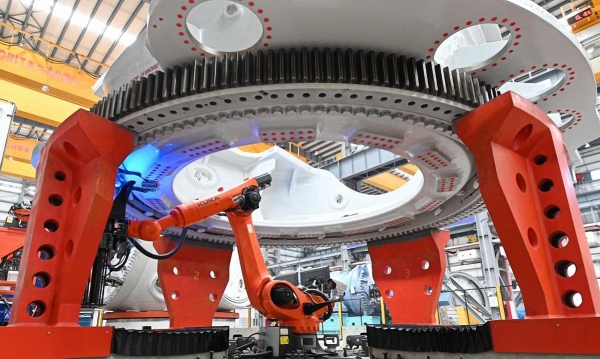
Dongfang Electric Corp's assembly line in Fujian province. LIN SHANCHUAN/XINHUA
The recent unveiling of a 26-megawatt offshore wind turbine in Fujian province marks a significant milestone for China's wind energy industry and reflects the country's growing leadership in renewable energy technology, said industry experts.
Dongfang Electric Corp unveiled the 26 MW offshore wind turbine in Fuqing, Fujian, the world's largest, on Saturday, entirely developed with independent intellectual property rights.
The turbine incorporates world-class technologies across key components, including the generator, blades, bearings and electronic control systems, it said.
Analysts said the turbine's debut represents more than a technological milestone. It highlights China's strategic intent to lead the renewable energy sector both domestically and globally.
"Chinese wind turbine original equipment manufacturers have been making efforts to increase turbine size and capacity to improve efficiency and reduce the cost of electricity," said Deng Simeng, a senior analyst for renewables and power research at global consultancy Rystad Energy.
"This 26 MW model is a key breakthrough in the Chinese wind turbine manufacturing industry, enabling offshore wind to capture higher wind speed and withstand stronger typhoons in the eastern and southern coastal regions, which is in line with the national plans to develop offshore wind toward deep-far sea areas."
Deng said the fully localized components of this turbine model have ensured that the costs are kept under control or even reduced as production scales up.
This also strengthens the competitiveness of Chinese companies in the world's offshore wind power sector, and expands China's role in global energy transition, Deng added.
The turbine is a testament to China's rapid progress in offshore wind technology, representing the most powerful wind turbine globally. Such breakthroughs position China as a leader in high-capacity wind energy solutions, which were previously dominated by European manufacturers, said Lin Boqiang, head of the China institute for studies in energy policy at Xiamen University.
This innovation is expected to attract international attention, further enhancing China's reputation for advanced offshore wind infrastructure and engineering capabilities, he said.
The 26 MW offshore wind turbine boasts a hub height of 185 meters, and is the largest single-capacity turbine with the longest rotor diameter globally, said Dongfang Electric.
The turbine is engineered with high corrosion resistance and features a dual anti-typhoon design, allowing it to withstand extreme typhoons. It is customized for medium-to-high wind speed in offshore regions with average wind speeds exceeding eight meters per second, ensuring lowered levels of energy costs and meeting grid parity requirements, it said.
China has been accelerating the transition to green energy. According to the National Energy Administration, installed capacity of solar power came in at approximately 750 million kilowatts in the first eight months of 2024, rocketing 48.8 percent year-on-year, and the installed capacity of wind power grew 19.9 percent to some 470 million kW.
Rapid development of the new energy sector in recent years resulted from full market competition, a sound business environment, constant tech innovation and a complete industrial chain, said Pan Huimin, deputy head of NEA's new and renewable energy department.
Local governments and enterprises should actively seize opportunities and exploit wind and solar power in line with local resources and with the capabilities of the grid to absorb the generated electricity, Pan said.
At an average wind speed of 10 meters per second, a single unit can generate 100 million kilowatt-hours of clean energy annually — enough to supply the electricity needs of 55,000 households for a year. This would save over 30,000 metric tons of standard coal and reduce carbon dioxide emissions by more than 80,000 tons annually, said the company.